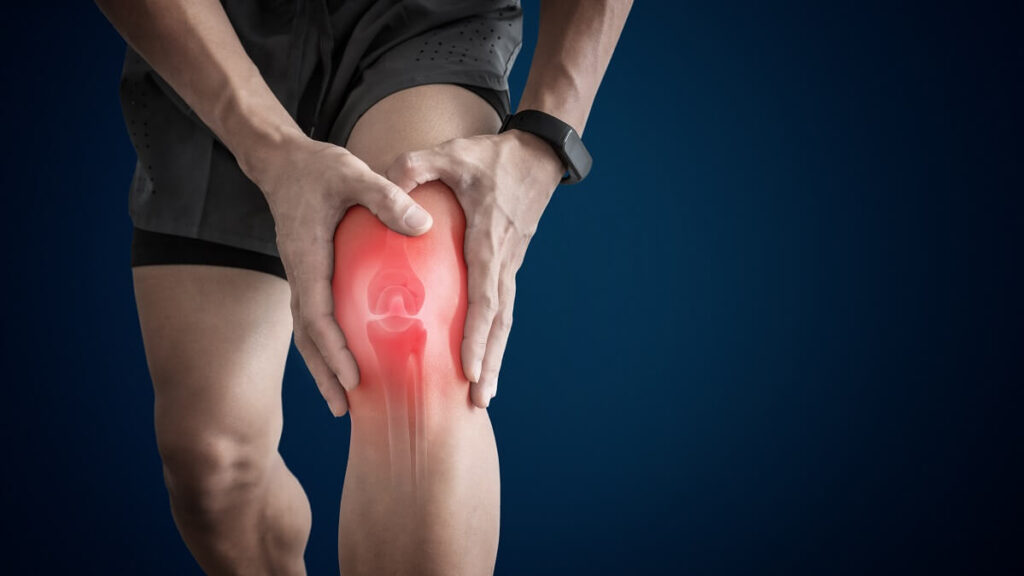Hands up if you’re a member of the ‘dodgy knees’ club. As someone who’s struggled with dodgy knees for some years now, I think I’m close to earning life membership.
Dodgy knees. It’s a funny old term, but there’s nothing very funny about the pain and inconvenience – even incapacitation – they can cause. So what, if anything, can you do about reducing that pain and inconvenience?
A good starting point is perhaps to give the term ‘dodgy knees’ a more formal definition. As all-encompassing as the phrase can be, in most cases it refers to osteoarthritis (OA).
What exactly is osteoarthritis, though? If you know your Greek word derivations, it’s not hard to work out. Osteo comes from the word ‘osteon’, meaning bone and ‘arthron’ is Greek for ‘joint’. And ‘itis’ simply translates to ‘inflammation of’. Put them all together and you have inflammation of the bone joint – osteoarthritis.
The modern British Australian equivalent of ‘itis’ these days is more often than not, ‘dodgy’.
In most cases, the dodginess occurs when the cartilage within a joint begins to break down and the underlying bone begins to change. This change happens at the ends of the bones, leading to the joint pain many of us experience.
Weight-bearing joints are particularly susceptible. And your knees do a lot of weight bearing.
What can be done to reduce the pain and inconvenience of dodgy knees?
Many will tell you to simply ‘lose weight’, but that, for most people, is not easy. Having said that, I have been fortunate enough to knock 11 kilograms off my own body so far this year and that, certainly, has led to less painful knees.
What other options are available?
The disappointing answer at the moment is ‘not many’. However, that hasn’t stopped a proliferation of so-called ‘cures’. Sadly, these ‘cures’ promise much but deliver little.
While ‘snake oil’ salespeople have been trying to flog miracle cures for generations, the advent of the internet and social media has given the industry new life. A quick online search will reveal a number of treatments that promise the world.
These include treatments such as stem cells, platelet-rich plasma, and Botulinum toxin. But the truth is, there’s very little scientific evidence that they are very effective, if at all. Stem cell injections, for instance are commercially available, but even the International Society for Stem Cell Research does not support their use for osteoarthritis.
What is supported is regular exercise. While this may be difficult if you are overweight, research has shown that exercise is key in managing knee OA. This also holds true for other joints.
In terms of day-to-day management of OA, painkillers can be your best friend. But even then, only some types of painkillers are recommended. The evidence suggests that non-steroidal anti-inflammatory medicines such as Nurofen or Voltaren provide the most effective pain relief for dodgy knees. Paracetamol has been shown to deliver little to no relief. And, as powerful as opioids are at treating acute pain, the evidence says they provide no relief from OA.
As for platelet-rich plasma, studies have shown they have as much effect as a placebo in the treatment of dodgy knees. Studies involving Botulinum toxin have similarly shown no efficacy.
Is surgery an option?
In short, yes, but even that option has its downside. You will often hear of professional footballers having an arthroscopy – a ‘clean-up’ of a knee. Research shows that arthroscopies are not effective for OA and are not recommended by most orthopaedic surgeons.
When all else fails, a knee replacement may be recommended. This will indeed treat OA successfully, but artificial knees don’t come with the same sideways movement as a natural knee. So, while you will be pain free, your range of movement will be curtailed.
The bottom line for dodgy knees is that your options are limited, but exercise, weight loss and the right pain medication could make life a lot better. A trip to your GP to discuss how to begin might help, too.
My dodgy knees are slightly less dodgy than they used to be. There’s a good chance yours can be, too.
Do you describe yourself as having dodgy knees? What, if anything, has helped alleviate your pain? Let us know in the comments section below.
Also read: Cortisone shots make arthritis worse: study
Health disclaimer: This article contains general information about health issues and is not advice. For health advice, consult your medical practitioner.

